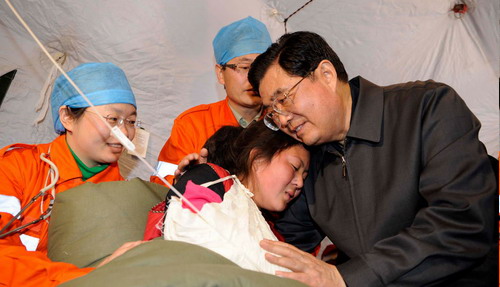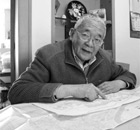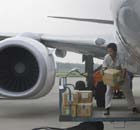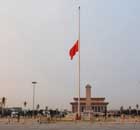Rescue & Aid
Hu lends comforting shoulder to survivors
By Fu Jing and Yan Jie (China Daily)
Updated: 2010-04-19 07:10
 |
Large Medium Small |
Lastest: As of 8:00 am April 19, the death toll has climbed to 1,944 from a devastating earthquake in northwest China's Qinghai Province, with another 216 still missing, rescuers said late Saturday.
As of 5 p.m. Saturday, the 7.1-magnitude quake, which struck the Tibetan Autonomous Prefecture of Yushu at 7:49 a.m. Wednesday, had also left 12,135 injured, 1,434 severely.
|
|
"Saving lives remains the first priority. We treasure every life and at the same time, we should ensure victims regain a normal life," Hu said before visiting a classroom at a local orphanage.
| ||||
Hu flew to Yushu after cutting short a visit to South America. He returned to Beijing on Saturday and held an emergency meeting to discuss relief efforts. Premier Wen Jiabao and Vice-Premier Hui Liangyu - who heads the rescue and relief operations - visited the region earlier.
Arriving with packs of relief material, Hu reassured residents of a brighter tomorrow as recovery slowly picked up amid sorrow and destruction.
"There will be new schools! There will be new homes!" Hu wrote in chalk on the blackboard of a temporary classroom set up in a tent, according to Xinhua.
Local authorities estimate that up to 90 percent of buildings collapsed after the earthquake.
At a field hospital on the grounds of a sports stadium, Hu sat on the bed of middle-school student Drolma, and held her as she wept. Her right arm was bandaged and supported by a sling.
"Rest assured, you will have a full recovery," he told her. "Don't worry. I know you are a good girl. Be strong. You will have a bright future. Grandpa will be thinking of you."
The 7.1-magnitude earthquake, the strongest to hit China in nearly two years, has affected 100,000 people, an official with the China Earthquake Administration (CEA) said Sunday.
The administration modified its estimate of the depth of the tremor's epicenter from 33 km to 14 km.
In Tashi Datong village where he met survivors, Hu said the provision of food, drinking water, shelter, quilts and warm clothing was a priority. Karma, the village chief, said more than 70 residents had died in the village.
Supplies have been scarce in this isolated, mountainous area which is 4,000 m above sea level. Civilian flights have been mostly suspended since the earthquake.
"There is a lot of work to be done, we will try our best," Hu said.
Tashi Yumco, 47, wept when Hu visited his tent. The president stayed for more than 20 minutes and handed him an envelope with money. Tashi's younger brother was killed in the tremor.
Hu also shook the hands of Pema Yutso, an illiterate 56-year-old living on State subsidies who lost her 10-year-old son in the disaster, and consoled her.
Karma Urgyen, another resident, said Hu promised them that sufficient food and clothing would soon arrive, and that the government would help them rebuild houses.
Most survivors were living in tents and had basic food and clean water, Zou Ming, head of disaster relief at the Ministry of Civil Affairs, said on Sunday.
"At the moment, the supplies that have been sent are enough to ensure people have shelter, food and water. A lot more supplies are in transit," he told reporters.
Disease-control experts joined the armed corps on Sunday to begin large-scale disinfection of the debris and ruins in Yushu.
The disinfection is to prevent water pollution, marmot plagues and outbreaks of respiratory and intestinal diseases in the wake of the disaster, local authorities said.
"The earthquake has increased the chance of a pneumonic plague outbreak spread by marmots," said Jie Xuehui, a provincial official overseeing public health.
Meanwhile, social order remains stable, and no criminal cases or major traffic accident have been reported in quake zones, Wu Heping, a spokesman for the Ministry of Public Security told a press conference on Sunday.
Aid continued to pour in. As of Sunday, Qinghai had received 375 million yuan ($55 million) in donations and donated goods and supplies worth 61 million yuan, according to the provincial bureau of finance.
The figures include donations received through all charity channels, including government departments of finance and civil affairs, as well as charity institutions like the Qinghai Red Cross.
The central government will grant each family of the dead a subsidy of 5,000 yuan ($732), to which the Qinghai government will add 3,000 yuan ($439), said Zou of the Ministry of Civil Affairs.
The ministry has also issued a joint circular along with the Ministry of Finance and the State Administration of Grain on subsidies to homeless survivors.
Those without an income will each be given a daily allowance of 10 yuan and 500 g of grain for three months. Orphaned children, the elderly who lost their children and the disabled will each get a monthly allowance of 600 yuan, according to the circular.












